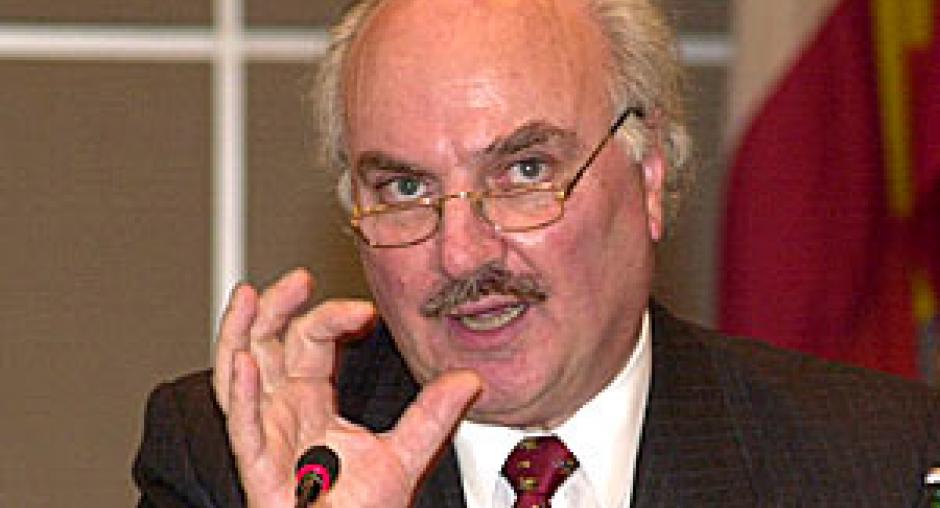Newsroom
OSCE States urged to stimulate conditions to reap benefits of globalization
VIENNA 4 July 2003

(OSCE/Daniel Rhodes)Chairman Frans Engering of the Netherlands opening the final session of the Conference on Globalization, Vienna, 4 July 2003. (OSCE/Daniel Rhodes) Photo details
VIENNA, 4 July 2003 - The first OSCE conference on the effects of globalization ended today in Vienna with calls by participants for the Organization and its participating States to further develop good governance and democratic institutions and to stimulate the conditions allowing populations to reap the benefits of a globalized economy.
"Development anywhere in the world cannot be reached without true commitment of a country to its own development, without proper structures and institutions, or without a strong doses of political will and perseverance," said Ambassador Frans Engering, Chairman of the conference and Permanent Representative of the Netherlands to the Organization for Economic Co-operation and Development (OECD).
"Between globalization and the achievement of the main principles of the OSCE there is a very positive correlation, but this requires good governance and an adequate and effective institutional infrastructure," he said. "The OSCE and its participants should encourage and stimulate the realization and establishment of these conditions, especially in those countries in the region that still haven't been able to sufficiently develop this at home."
Marcin Swiecicki, Co-ordinator of OSCE Economic and Environmental Activities, said countries would be able to reap the benefits of globalization if they fostered good governance, agreed on universal principles and implemented internationally acknowledged best practices.
He also stressed the importance of the human factor - education, training and capacity-building - for allowing transition countries to handle modern market institutions and integrate successfully into the world economy.
In four sessions, some 200 representatives of participating States and expert speakers discussed over two days what role the OSCE could play in the relationship between globalization and economic development on one hand, and issues such as conflict prevention and human security on the other.
Among other findings, participants recognized the problem that demographic trends would play in the future, with a sharp rise in Europe's median age predicted for 2050.
Other discussions revolved around the need for sustainable development which included the responsibility to maintain a healthy environment and functional and inclusive social systems for future generations.
Alan Rousso of the European Bank for Reconstruction and Development pointed out that research had found a strong correlation between successful political and economic transition.
"Regionalization, which involves liberalization of trade, capital and labour among regional partners as well as political and institutional components, has been another dominant economic trend over the last decades," he said.
Other participants said liberalizing and opening economies was not enough to reap the benefits of globalization - it was equally important for states to improve governance and increase openness and transparency.
More information and conference documents and speeches can be found at the special conference website.
"Development anywhere in the world cannot be reached without true commitment of a country to its own development, without proper structures and institutions, or without a strong doses of political will and perseverance," said Ambassador Frans Engering, Chairman of the conference and Permanent Representative of the Netherlands to the Organization for Economic Co-operation and Development (OECD).
"Between globalization and the achievement of the main principles of the OSCE there is a very positive correlation, but this requires good governance and an adequate and effective institutional infrastructure," he said. "The OSCE and its participants should encourage and stimulate the realization and establishment of these conditions, especially in those countries in the region that still haven't been able to sufficiently develop this at home."
Marcin Swiecicki, Co-ordinator of OSCE Economic and Environmental Activities, said countries would be able to reap the benefits of globalization if they fostered good governance, agreed on universal principles and implemented internationally acknowledged best practices.
He also stressed the importance of the human factor - education, training and capacity-building - for allowing transition countries to handle modern market institutions and integrate successfully into the world economy.
In four sessions, some 200 representatives of participating States and expert speakers discussed over two days what role the OSCE could play in the relationship between globalization and economic development on one hand, and issues such as conflict prevention and human security on the other.
Among other findings, participants recognized the problem that demographic trends would play in the future, with a sharp rise in Europe's median age predicted for 2050.
Other discussions revolved around the need for sustainable development which included the responsibility to maintain a healthy environment and functional and inclusive social systems for future generations.
Alan Rousso of the European Bank for Reconstruction and Development pointed out that research had found a strong correlation between successful political and economic transition.
"Regionalization, which involves liberalization of trade, capital and labour among regional partners as well as political and institutional components, has been another dominant economic trend over the last decades," he said.
Other participants said liberalizing and opening economies was not enough to reap the benefits of globalization - it was equally important for states to improve governance and increase openness and transparency.
More information and conference documents and speeches can be found at the special conference website.
